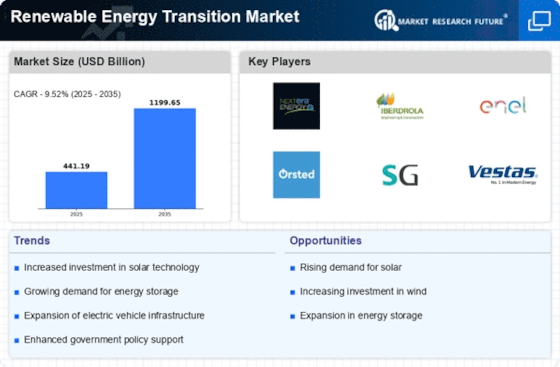Top Industry Leaders in the Renewable Energy Transition Market
*Disclaimer: List of key companies in no particular order
Top listed global companies in the renewable energy transition industry are:
Exelon Corporation
Duke Energy Corporation
Pacific Gas and Electric Company
Southern Company
American Electric Power
Edison International
Repsol
Brookfield Renewable Partners
Plug Power Inc.
Enphase
First Solar
Bridging the Gap by Exploring Top Leaders Competitive Landscape of the renewable energy transition Market
The global renewable energy transition market is a dynamic and rapidly evolving space, characterized by fierce competition and constant innovation. Understanding the key players, their strategies, and emerging trends is crucial for any company hoping to gain a foothold in this burgeoning sector.
Key Players and Strategies:
Traditional Energy Companies: Major oil and gas giants are actively diversifying their portfolios, acquiring renewable energy assets, and investing in clean technologies. These companies leverage their existing infrastructure and customer base to gain an edge.
Renewable Energy Developers: Established players like Siemens Gamesa, Ørsted, and EDF Renewables dominate the utility-scale market with their expertise in project development, financing, and operations. They focus on optimizing efficiency and cost reduction to secure large-scale contracts.
Technology Innovators: Emerging companies are pushing the boundaries with cutting-edge solutions in areas like solar storage, distributed generation, and green hydrogen. Their agility and focus on niche markets allow them to disrupt established players.
Financial Institutions: Investment banks and private equity firms are playing a vital role in financing renewable energy projects, providing much-needed capital and expertise. They seek partnerships with established developers and invest in promising new technologies.
Market Share Analysis:
Technology Type: Solar and wind currently hold the largest market shares, but biomass, geothermal, and hydro power also contribute significantly. The market mix is expected to evolve, with emerging technologies like offshore wind and green hydrogen gaining traction.
Geographical Distribution: Asia-Pacific leads the market in terms of installed capacity, followed by Europe and North America. However, regional dynamics are shifting as developing nations prioritize clean energy access and attract investments.
Policy Landscape: Government policies like carbon pricing, feed-in tariffs, and renewable energy mandates significantly impact market growth and investment decisions. Tracking policy developments across regions is crucial for navigating the competitive landscape.
New and Emerging Trends:
Decentralization: The rise of distributed generation, microgrids, and smart grids is empowering consumers and businesses to take control of their energy production and consumption.
Digitalization: Data analytics, artificial intelligence, and blockchain technologies are being utilized to optimize operations, improve grid management, and enhance transparency in the renewable energy sector.
Integration with Other Sectors: Renewable energy is increasingly being integrated with transportation, buildings, and industrial processes, creating new opportunities for cross-sector collaborations and market expansion.
Competitive Scenario:
The renewable energy transition market is characterized by intense competition, with players vying for market share through:
Cost Reduction: Companies are constantly innovating to reduce the cost of renewable energy generation and storage, thereby increasing their competitiveness.
Technological Differentiation: Investing in cutting-edge technologies and niche markets allows companies to stand out from the crowd and attract investors.
Strategic Partnerships: Collaborations between players across the value chain are becoming increasingly common, fostering knowledge sharing and accelerating market penetration.
Focus on Sustainability: Companies are increasingly emphasizing environmental and social responsibility as a differentiator, aligning themselves with the growing demand for ethical and sustainable business practices.
Latest Company Updates:
Exelon Corporation:
- Committed to net-zero carbon by 2045, investing $27 billion in renewables by 2024 (Exelon Press Release, Oct 26, 2023).
Duke Energy Corporation:
- Aiming for carbon neutrality by 2050, tripling renewable energy capacity by 2030 (Duke Energy website).
Pacific Gas and Electric Company (PG&E):
- Planning to invest $88 billion in clean energy by 2030, aiming for carbon neutrality by 2040 (PG&E website).
Southern Company:
- Targeting net-zero by 2050, with plans for 44 GW of renewable energy additions by 2030 (Southern Company website).










